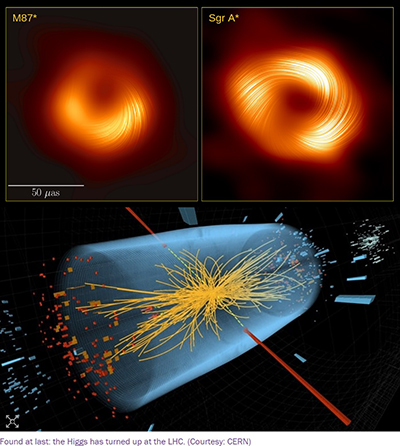High-Energy Physics and Quantum Gravity
 Ancient Greek philosophers debated whether reality can be explained with a small number
of fundamental elements, such as fire or water, or principles, like that everything
is made of indivisible atoms. Modern day high-energy physics is a continuation of
those debates. Fortunately, by now we have invented a much better way to go about
and settle our debates: science. These days, the fundamental principles we seek are
mathematical frameworks that describe the physical world in terms of elementary constituents
(like particles, fields, or strings) and laws governing their behavior. The most successful
frameworks so far are quantum mechanics (QM) and general relativity (GR). Together,
they form the two pillars of high-energy physics. Though we have made much progress,
like an ever-expanding frontier, the more we know, the more we discover there is even
more yet to know. Along the way, this area of physics has had important spin-off applications,
such as in astrophysics (e.g., for black holes and early universe cosmology) and in
condensed matter physics (e.g., field theories of superconductors and other materials).
Faculty at SJSU tackle a variety of questions in theoretical high-energy physics.
We question and ultimately look to strengthen the philosophical underpinnings of QM.
Furthermore, why have two pillars if you can have one? Can QM and GR be unified? Does
this lead to new, experimentally verifiable predictions? This requires either starting
with GR and quantizing it, or starting with QM and deriving GR from it, or deriving
both from, say, a more fundamental information-theoretic framework. We actively work
on some of these possibilities and are also interested in applications of our theoretical
tools to problems throughout physics. For information and to learn about research
opportunities, contact Curtis Asplund, Kassahun Betre, or Kenneth Wharton.
Ancient Greek philosophers debated whether reality can be explained with a small number
of fundamental elements, such as fire or water, or principles, like that everything
is made of indivisible atoms. Modern day high-energy physics is a continuation of
those debates. Fortunately, by now we have invented a much better way to go about
and settle our debates: science. These days, the fundamental principles we seek are
mathematical frameworks that describe the physical world in terms of elementary constituents
(like particles, fields, or strings) and laws governing their behavior. The most successful
frameworks so far are quantum mechanics (QM) and general relativity (GR). Together,
they form the two pillars of high-energy physics. Though we have made much progress,
like an ever-expanding frontier, the more we know, the more we discover there is even
more yet to know. Along the way, this area of physics has had important spin-off applications,
such as in astrophysics (e.g., for black holes and early universe cosmology) and in
condensed matter physics (e.g., field theories of superconductors and other materials).
Faculty at SJSU tackle a variety of questions in theoretical high-energy physics.
We question and ultimately look to strengthen the philosophical underpinnings of QM.
Furthermore, why have two pillars if you can have one? Can QM and GR be unified? Does
this lead to new, experimentally verifiable predictions? This requires either starting
with GR and quantizing it, or starting with QM and deriving GR from it, or deriving
both from, say, a more fundamental information-theoretic framework. We actively work
on some of these possibilities and are also interested in applications of our theoretical
tools to problems throughout physics. For information and to learn about research
opportunities, contact Curtis Asplund, Kassahun Betre, or Kenneth Wharton.
HEP at SJSU
In addition to standard research opportunites, students interested in high-energy physics at SJSU have the opportunity to apply for the HEP at SJSU training program, which provides full-time paid summer research, part-time paid academic year research with SJSU faculty and members of the SLAC National Accelerator Laboratory. For more information, see the HEP at SJSU [pdf] flyer. Applications are due on October 11, 2024.